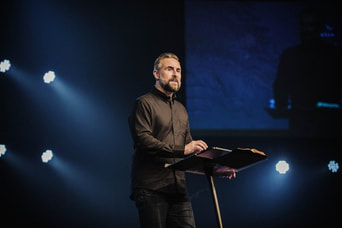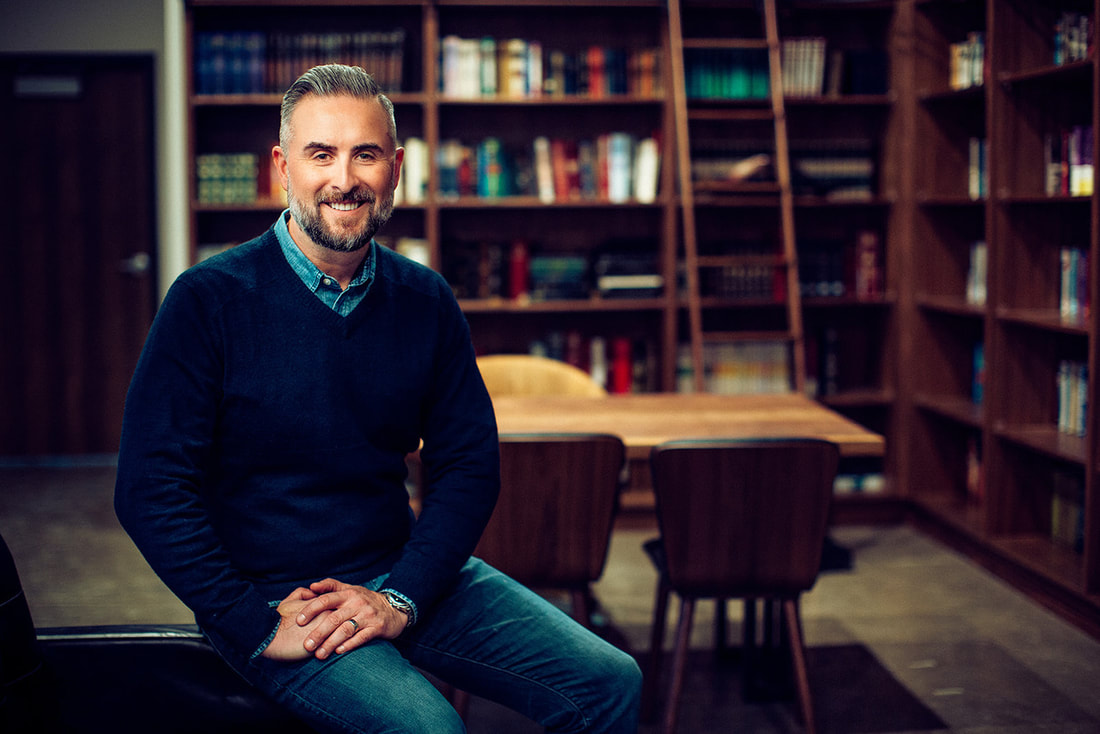Q&A with Pastor Lee Cummings
Author of “School of the Spirit: Living the Holy Spirit-Empowered Life”

Q: You say in your new book that the Holy Spirit is the most misunderstood person of the Trinity. Why is that?
A: When we talk about God as “Father”, we have a frame of reference for what a Father does, or should do: procreates, protects and provides. When we talk about God the Son, we have four gospels to read about what Jesus was and is like. We see him teach, correct, laugh, cry, show compassion and pray to the Father. We see him sacrifice and lay his life down. But when we come to the Holy Spirit… its mysterious. Jesus said it’s like the wind (John 3). We see the effects of Him but cannot grasp him or relate. Sometimes our only point of reference is the way Hollywood portrays spirits…in this situation, its sometimes easier to ignore HIM because it’s too difficult to embrace. We end up with a Triune God of Father, Son and Holy Bible instead of embracing and growing in our understanding with the Spirit of God, our Helper.
Q: You talk about the Western World having a bias against the supernatural. What do you mean by that?
A: Western civilization has been infected with a deadly virus. That virus is secularism that is rooted in the Enlightenment, which has produced a naturalistic worldview that only believes in what our five natural senses can experience, and science can test. We have become skeptical against claims of the supernatural and invisible. In this way, man is at the center of the universe and the unseen realm has been relegated to medieval myths, leaving our culture spiritually bankrupt.
Q: You mention that sanctification is one role of the Holy Spirit. Why is that not taught more often in our churches today?
A: Our American gospel has been reduced to praying a prayer of faith and then awaiting Heaven as our reward when we die. We have not developed a healthy understanding of how God wants to continue His work that began at salvation throughout all the days of our lives, conforming us into the image of Christ.
A: When we talk about God as “Father”, we have a frame of reference for what a Father does, or should do: procreates, protects and provides. When we talk about God the Son, we have four gospels to read about what Jesus was and is like. We see him teach, correct, laugh, cry, show compassion and pray to the Father. We see him sacrifice and lay his life down. But when we come to the Holy Spirit… its mysterious. Jesus said it’s like the wind (John 3). We see the effects of Him but cannot grasp him or relate. Sometimes our only point of reference is the way Hollywood portrays spirits…in this situation, its sometimes easier to ignore HIM because it’s too difficult to embrace. We end up with a Triune God of Father, Son and Holy Bible instead of embracing and growing in our understanding with the Spirit of God, our Helper.
Q: You talk about the Western World having a bias against the supernatural. What do you mean by that?
A: Western civilization has been infected with a deadly virus. That virus is secularism that is rooted in the Enlightenment, which has produced a naturalistic worldview that only believes in what our five natural senses can experience, and science can test. We have become skeptical against claims of the supernatural and invisible. In this way, man is at the center of the universe and the unseen realm has been relegated to medieval myths, leaving our culture spiritually bankrupt.
Q: You mention that sanctification is one role of the Holy Spirit. Why is that not taught more often in our churches today?
A: Our American gospel has been reduced to praying a prayer of faith and then awaiting Heaven as our reward when we die. We have not developed a healthy understanding of how God wants to continue His work that began at salvation throughout all the days of our lives, conforming us into the image of Christ.

Q: You draw a parallel between Exodus 20 and the day of Pentecost in Acts. Talk about that connection.
A: The feast of Pentecost was a commemoration of God coming in power to give the Law to Israel at Mt. Sinai. His intention was to speak it over them and establish Israel as His covenant people to become lights to the nations of the world — so they would come to desire God. In fact, when God spoke the law first, it is said He spoke it in 70 languages simultaneously. This mission failed when Israel pulled back from His presence and were satisfied with the written law on tablets. This feast was also called the Feast of Harvest. In Acts 2, on the very same day, God came down again in fire, power and love. He filled the Church, His new covenant people, and wrote the Law on their hearts. He dispersed fire over them and had them speak out the praises of God in multiple languages while people from every nation of the earth were present. God had fulfilled his desired goal finally and empowered the church to go into the nations.
Q: Many have equated salvation with the baptism of the Holy Spirit. What do you believe the Bible teaches about that?
A: There are some evangelicals who argue that we receive the Holy Spirit at conversion and that’s all that there is. Yet, they read the book of Acts and see that the same disciples who received the Holy Spirit in the upper room with Jesus, receive Him again in Acts chapter two on the day of Pentecost and again in Acts chapter 4. Some claim that the phrase “baptism in or with the Holy Spirit” is problematic and we should just use the phrase “filled” with the Holy Spirit with the gifts of the spirit activated. Regardless of the semantics, what we can all agree upon is we need MORE of the Holy Spirit. Not quantitatively but qualitatively. We must be continually filled with the Holy Spirit (Eph 5) and this requires us having a starting point after conversion in which we recognize our need of more, and invite the Person of the Holy Spirit to have more control of us and to release the power Jesus promised to us.
Q: Shall we open a can of worms? Is the gift of tongues for everyone or is it a singular gift for some people?
A: I believe that the gift of tongues, like all the other manifestations, is available for every believer. If the gift giver lives in us, then He can manifest anyway He wants. Tongues is not proof of anything, but it is the privilege and powerfully available gift for all who respond to Paul’s admonition to “earnestly desire the gifts"
Q: Some theologians believe the gifts of the Holy Spirit are no longer in operation. Why are they wrong?
A: You have to do some theological gymnastics to make the Bible say that the gifts are gone. Church history doesn’t support this statement and the experience of over 3/4 of Christians globally begs to differ.
Q: If you could explain the Holy Spirit to someone in one or two sentences, what would you say?
A: The Holy Spirit is the abiding Presence of God with us, to lead and teach us, conform us to be like Jesus, intercede on our behalf and empower us to follow Jesus supernaturally. The Holy Spirit is your greatest advantage this side of eternity.
A: The feast of Pentecost was a commemoration of God coming in power to give the Law to Israel at Mt. Sinai. His intention was to speak it over them and establish Israel as His covenant people to become lights to the nations of the world — so they would come to desire God. In fact, when God spoke the law first, it is said He spoke it in 70 languages simultaneously. This mission failed when Israel pulled back from His presence and were satisfied with the written law on tablets. This feast was also called the Feast of Harvest. In Acts 2, on the very same day, God came down again in fire, power and love. He filled the Church, His new covenant people, and wrote the Law on their hearts. He dispersed fire over them and had them speak out the praises of God in multiple languages while people from every nation of the earth were present. God had fulfilled his desired goal finally and empowered the church to go into the nations.
Q: Many have equated salvation with the baptism of the Holy Spirit. What do you believe the Bible teaches about that?
A: There are some evangelicals who argue that we receive the Holy Spirit at conversion and that’s all that there is. Yet, they read the book of Acts and see that the same disciples who received the Holy Spirit in the upper room with Jesus, receive Him again in Acts chapter two on the day of Pentecost and again in Acts chapter 4. Some claim that the phrase “baptism in or with the Holy Spirit” is problematic and we should just use the phrase “filled” with the Holy Spirit with the gifts of the spirit activated. Regardless of the semantics, what we can all agree upon is we need MORE of the Holy Spirit. Not quantitatively but qualitatively. We must be continually filled with the Holy Spirit (Eph 5) and this requires us having a starting point after conversion in which we recognize our need of more, and invite the Person of the Holy Spirit to have more control of us and to release the power Jesus promised to us.
Q: Shall we open a can of worms? Is the gift of tongues for everyone or is it a singular gift for some people?
A: I believe that the gift of tongues, like all the other manifestations, is available for every believer. If the gift giver lives in us, then He can manifest anyway He wants. Tongues is not proof of anything, but it is the privilege and powerfully available gift for all who respond to Paul’s admonition to “earnestly desire the gifts"
Q: Some theologians believe the gifts of the Holy Spirit are no longer in operation. Why are they wrong?
A: You have to do some theological gymnastics to make the Bible say that the gifts are gone. Church history doesn’t support this statement and the experience of over 3/4 of Christians globally begs to differ.
Q: If you could explain the Holy Spirit to someone in one or two sentences, what would you say?
A: The Holy Spirit is the abiding Presence of God with us, to lead and teach us, conform us to be like Jesus, intercede on our behalf and empower us to follow Jesus supernaturally. The Holy Spirit is your greatest advantage this side of eternity.
About the author:
|
Lee Cummings is the founding Senior Pastor of Radiant Church, and serves as the Senior Leader of Radiant Network, a family of like-minded churches spread across North America. He speaks frequently at leadership events, conferences, and churches worldwide. His previous books include “Be Radiant” and “Flourish: Planting Your Life Where God Designed it to Grow.” He and his wife Jane planted Radiant Church in Kalamazoo, Michigan where they still reside. For more information visit https://leemcummings.com/.
|
